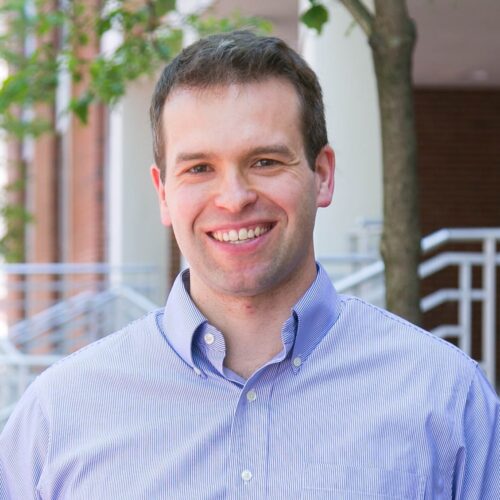Douglas Call
Assoc Professor

- dfcall@ncsu.edu
- Fitts-Woolard Hall 3179
Dr. Call is an Associate Professor in the Department of Civil, Construction, and Environmental Engineering at North Carolina State University. Dr. Call is interested in biological and electrochemical processes to treat water and wastewater and recover resources from wastes. Watch a short video below to hear Dr. Call briefly explain his research focus.
Dr. Call received both his MS (2008) and PhD (2011) in Environmental Engineering from Penn State University. He continued as a postdoctoral scientist at Penn State until becoming an Assistant Professor of Civil and Environmental Engineering at Syracuse University in 2012. He is currently teaching CE 373 Fundamentals of Environmental Engineering, CE 378 Environmental Chemistry and Microbiology, and CE 573 Biological Principles of Environmental Engineering at NC State.
Education
Environmental Engineering
The Pennsylvania State University
Environmental Engineering
The Pennsylvania State University
Civil Engineering
Virginia Polytechnic Institute and State University
Environmental Sciences
University of Virginia
Research Description
Dr. Call's research focuses on technologies that recover resources from wastes and generate new resources using lower carbon footprints than conventional approaches. He has expertise in both biological and electrochemical principles. Examples of current research interests include: (1) "rewiring" anaerobic digestion to produce high-value chemicals, (2) developing hybrid microbial-material interfaces that quickly and thorougly transform aqueous contaminants, (3) desalination of brackish water using capacitive deionization (CDI), (4) improving phosphorus removal from wastewater using biological approaches, (5) using electrochemical approaches to remove and recover carbon dioxide and metals from aqueous sources, and (6) conversion of nitrogen gas into ammonium using microbial electrochemical technologies.
Honors and Awards
- National Science Foundation CAREER Award, 2020
- Gertrude Cox Award for Innovative Excellence in Teaching and Learning with Technology, 2019
- Outstanding Young Alumni Award - Virginia Tech, 2019
Publications
- Nitrogen Fixation and Ammonium Assimilation Pathway Expression of Geobacter sulfurreducens Changes in Response to the Anode Potential in Microbial Electrochemical Cells
- Ortiz-Medina, J. F., Poole, M. R., Grunden, A. M., & Call, D. F. (2023, March 28), APPLIED AND ENVIRONMENTAL MICROBIOLOGY, Vol. 3. https://doi.org/10.1128/aem.02073-22
- Perspective: Phosphorus monitoring must be rooted in sustainability frameworks spanning material scale to human scale
- McLamore, E., Duckworth, O., Boyer, T. H., Marshall, A.-M., Call, D. F., Bhadha, J. H., & Guzman, S. (2023), WATER RESEARCH X, 19. https://doi.org/10.1016/j.wroa.2023.100168
- The challenge of non-reactive phosphorus: Mechanisms of treatment and improved recoverability using electrooxidation
- Mallick, S. P., Hossain, M. S., Takshi, A., Call, D. F., & Mayer, B. K. (2023), JOURNAL OF ENVIRONMENTAL CHEMICAL ENGINEERING, 11(5). https://doi.org/10.1016/j.jece.2023.110295
- Improving Long-Term Anode Stability in Capacitive Deionization Using Asymmetric Electrode Mass Ratios
- Algurainy, Y., & Call, D. F. (2022), ACS ES&T ENGINEERING, 2(1), 129–139. https://doi.org/10.1021/acsestengg.1c00348
- Influence of Inoculum Type on Volatile Fatty Acid and Methane Production in Short-Term Anaerobic Food Waste Digestion Tests
- Ding, H., Barlaz, M. A., de los Reyes III, F. L., & Call, D. F. (2022, December 9), ACS SUSTAINABLE CHEMISTRY & ENGINEERING, Vol. 12. https://doi.org/10.1021/acssuschemeng.2c04080
- Mechanisms of orthophosphate removal from water by lanthanum carbonate and other lanthanum-containing materials
- Zhi, Y., Paterson, A. R., Call, D. F., Jones, J. L., Hesterberg, D., Duckworth, O. W., … Knappe, D. R. U. (2022), SCIENCE OF THE TOTAL ENVIRONMENT, 820. https://doi.org/10.1016/j.scitotenv.2022.153153
- Developing microbial communities containing a high abundance of exoelectrogenic microorganisms using activated carbon granules
- Cheng, Q., & Call, D. F. (2021), SCIENCE OF THE TOTAL ENVIRONMENT, 768. https://doi.org/10.1016/j.scitotenv.2020.144361
- Evidence of thermophilic waste decomposition at a landfill exhibiting elevated temperature regions
- De la Cruz, F. B., Cheng, Q., Call, D. F., & Barlaz, M. A. (2021), Waste Management, 124, 26–35. https://doi.org/10.1016/j.wasman.2021.01.014
- Influence of natural organic matter and pH on phosphate removal by and filterable lanthanum release from lanthanum-modified bentonite
- Zhi, Y., Call, D. F., Grieger, K. D., Duckworth, O. W., Jones, J. L., & Knappe, D. R. U. (2021), Water Research, 202, 117399. https://doi.org/10.1016/j.watres.2021.117399
- Life cycle assessment of salinity gradient energy recovery using reverse electrodialysis
- Mueller, K. E., Thomas, J. T., Johnson, J. X., DeCarolis, J. F., & Call, D. F. (2021), JOURNAL OF INDUSTRIAL ECOLOGY, 25(5), 1194–1206. https://doi.org/10.1111/jiec.13082
Grants
- Biocatalyst Interactions with Gases (BIG) Collaboration
- Novo Nordisk Foundation(9/01/22 - 8/31/27)
- Converting Textile Waste to Pumpable Slurry for Biogas Production
- Environmental Research & Education Foundation(9/01/21 - 8/31/23)
- Harnessing (bio-)electrochemical Technologies as Sustainable Sources for on Demand Precision Agriculture
- Game-Changing Research Incentive Program for Plant Sciences (GRIP4PSI)(2/17/20 - 6/30/24)
- Science and Technologies for Phosphorus Sustainability (STEPS) Center
- National Science Foundation (NSF)(10/01/21 - 9/30/26)
- CAREER: Leveraging the Multifunctional Redox Properties of Pyrogenic Materials to Enable Biological Transformations of Aqueous Organic Contaminants
- National Science Foundation (NSF)(7/01/20 - 6/30/25)
- An Electroactive Point-of-Use Filter for Per- and Polyfluoroalkyl Contaminant Removal
- US Environmental Protection Agency (EPA)(10/01/19 - 8/15/21)
- Recovering High-value Acids from Anaerobic Co-digestion of Municipal Solid and Grease Interceptor Waste Using an Electrically Driven Separation Process
- Environmental Research & Education Foundation(5/01/19 - 4/30/22)
- EAGER Electrically Driving the Microbial Conversion of Nitrogen Gas into Ammonia
- National Science Foundation (NSF)(8/15/18 - 7/31/20)
- Electrically Assisted Sorption and Desorption of Per- and Polyfluoroalkyl Substances
- Strategic Environmental Research and Development Program (SERDP)(5/16/18 - 5/16/21)
- Methane Conversion to Electrical Current using Microbial Electrochemical Technologies
- NCSU Research and Innovation Seed Funding Program(1/01/15 - 12/31/15)
